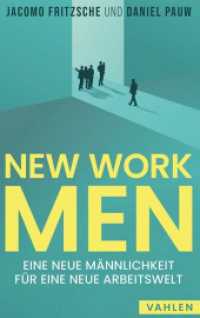- ホーム
- > 洋書
- > ドイツ書
- > Humanities, Arts & Music
- > Religion & Theology
Full Description
In the diasporic communities of Roman Catholics in Ukraine (Murafa) and Greek Catholics in Poland (Biały Bór) religion and the local clergy play a dominant role in the process of constructing new identities. Because of the memory of their ancestors' deportation trauma the Greek Catholics define their Ukrainianness in opposition to their environment. In Roman Catholics' case, the change of the liturgy's language is followed by the Polish tradition's rejection: they feel Ukrainian. The break of the tradition's transmission path divides the community and directs them towards (pop)cultural homogenization with the Orthodox. The Greek Catholics are also divided because of their new church; universal in the Christian sense, it proves the overcoming of divisions, not accepted by everyone.
Contents
Religious culture - Catholic communities in Murafa and Biały Bór - Linguistic - Aesthetics - Musical expression - Importance of religion - Religious authorities - Memory in constructing identity - State policy's impact - Mixed marriages








